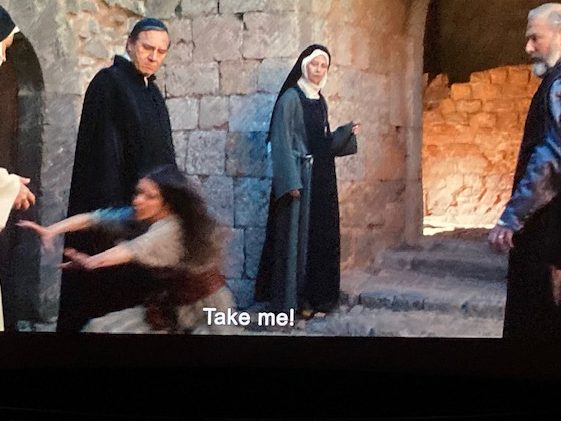
The film “Spencer“ premiered at my local AMC location this weekend. I had waited weeks for a chance to see what the filmmakers call a ”fable based on a true story” about the late Princess Diana. In all honesty, I wasn’t holding my breath that the film would be fully accessible to my hard of hearing ears since captioned movie showings are rare at my local AMC Theatre. At the most, I hoped on seeing it in a closed caption format, which historically was all that AMC provided in the way of accessibility from my past experience.
Lo and behold, there was a single open captioned showing of ”Spencer” advertised as a Saturday matinee. It had been so long since seeing an OC movie on the AMC big screen that I expected the whole thing to be a dream, that the captions wouldn’t work and I would need to request a refund. Here was the surprise: Everything shown, from the first preview to the lyrics of Spencer’s closing song, was open captioned.
Start the previews…
The movie then began with music and sound effects.
One of the things that I have wondered about open captioned movies is why the music is not fully captioned. A film usually features the word “music” or a series of music notes, such as 🎶, flash across the screen and then nothing else. From Spencer’s first scene, an intense musical score flowed and, thanks to some intense captioning, I knew the music’s genre, tone, and pace. With sound effects shown in previous films, typical captioning would reveal few words, leaving me wondering what movie sounds my hearing peers heard.
Not so with Spencer. In this first scene, a text description of sound danced across the screen.
And then Princess Di spoke.
Diana, as portrayed by actress Kristen Stewart, graced the screen and I actually understood what she said. Any type of accent is difficult for me to understand without captioning. The most difficult for my ears to interpret is a British accent. Part of that may be due to how certain vowel sounds are pronounced differently than what I grew up hearing in the U. S. South and Midwest. Thank goodness for captions to provide a bit of clarity.
I won’t reveal any movie spoilers but had to share this open captioned clip of Princess Diana in an early scene.
And now a message for AMC Theatres…
After this most accessible movie-going experience, I have two words for AMC Theatres: Thank you.
Thank you for bringing more open captioned movies to your theaters.
Thank you for putting your words into actions.
Thank you for valuing accessibility.
Thank you for fully complying with the Americans with Disabilities Act (ADA).
Thank you for listening to your patrons who have insisted that open captions are far preferable to closed captions.
Thank you for the best Saturday movie matinee experience of Lipreading Mom’s life.
What has been your experience with open captioned movies?
Please share in the comments.





Love this! I’m so glad that you were able to enjoy the movie!
Thank you, Kristen!
I’m so glad this worked out for you !
Thanks so much, Rebecca!